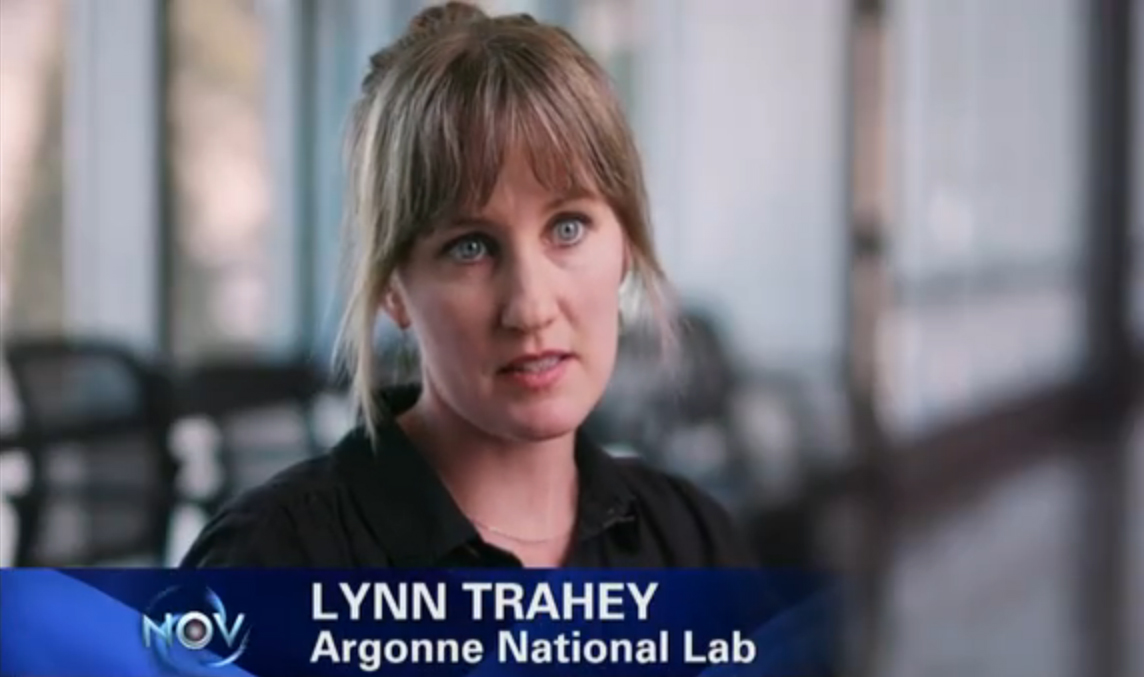Videos
-

Energy Storage Emerging
Instead of trying to find battery chemistries specifically tailored to particular technological needs, JCESR researchers have traded a “top-down” process for a ”bottom-up” approach in which they focus on fundamental investigations of different chemical processes on the atomic and molecular levels. “The idea… Read More
-

Technology
JCESR’s focus has changed to building transformational materials from the bottom up, atom-by-atom and molecule-by-molecule, where each atom or molecule plays a prescribed role in producing the desired overall materials performance. We could not have done this 10 years ago when the advanced scientific… Read More
-

Team Approach
JCESR is a collaborative team of engineers and scientists with very broad backgrounds. In the battery space we are now facing challenges that required a multidisciplinary approach that no single group can achieve. Made up of 18 partner institutions, JCESR’s diversity and the opportunity… Read More
-

Renewed Focus
JCESR has had a very successful first five years. The personal relationships we’ve formed now enable us to move forward with even more momentum. Recently, the team of more than 150 came together for its first full program meeting since renewal. As stated by… Read More
-

Better Batteries Hold Promise for a Sustainable Future
Better batteries for electric cars and cellphones and better batteries for industrial use that can store excess power generated by wind and solar farms and then supply it to the grid at times of peak demand are greatly needed. The ability to efficiently store energy… Read More
-

Search for the Super Battery
We live in an age when technological innovation seems to be limitlessly soaring. But for all the satisfying speed with which our gadgets have improved, many of them share a frustrating weakness: the batteries. Aired on February 1, 2017, this NOVA program entitled… Read More
-

Energy Storage Has the Potential to Change the Way We Live
This CNBC Special Report discusses how the striking and swift evolution of cell phones from cumbersome bricks to sleek, powerful devices was possible because of the lithium-ion batteries used to charge them up. Next-gen batteries could bring the kind of change we’ve seen in telephones to electric vehicles and the grid. Read More
-

Energy Storage: George Crabtree
George Crabtree, JCESR Director, discusses the importance of developing the next generation of batteries and how that could help transform transportation and the electricity grid. Read More
-

Are Lithium-Ion Batteries Safe?
Lithium-ion batteries are used in all kinds of devices. While there are very few safety issues relative to the millions of batteries in use, in light of some recent lithium-ion safety issues, Kris Van Cleave at CBS Evening News took a look at their safety. Read More
-

Sparingly Solvating Electrolytes for High Energy Density Lithium-Sulfur Batteries
As JCESR scientists work to develop lighter and less expensive chemistries than those used in current lithium-ion batteries, lithium-sulfur shows tremendous promise. This perspective presents an alternate approach that could move us closer to long-lived, high energy density lithium-sulfur batteries. Read More
Latest Updates
-
You’re Invited - JCESR and Beyond: Translating the Basic Science of Batteries
Please join us at Argonne National Laboratory on Tuesday, April 4, 2023 for JCESR and Beyond: Translating the Basic Science of Batteries. Registration is now open. This in-person event will celebrate 10 years of research from the Joint Center… Read More
-
A Message from JCESR: In Memory of George Crabtree
It is with heavy hearts that we say goodbye to George Crabtree, a Senior Scientist and Distinguished Fellow at Argonne National Laboratory, and Director of the Joint Center for Energy Storage Research (JCESR), who passed away unexpectedly on January 23. Dr. Read More
-
Cyanopyridines As Extremely Low-Reduction-Potential Anolytes for Nonaqueous Redox Flow Batteries
Discovery of a cyanophenylpyridine derivative with a very low reduction potential and good stability during cycling. Read More
-
Characterizing Redoxmer – Electrode Kinetics Using a SECM-Based Spot Analysis Method
Identified asymmetries in electron transfer (ET) kinetics between the reduction and oxidation of ferrocene-based redoxmers by measuring the ET rate constants (kf/kb) as a function of electrode potential. Read More
-
Benzotriazoles as Low Potential Anolytes for Non-Aqueous Redox Flow Batteries
We developed an easy-to-synthesize benzotriazole-based anolyte with a high energy redox potential (-2.3 V vs Fc/Fc+) and high solubility that demonstrates stable electrochemical cycling performance. Read More

